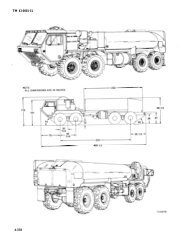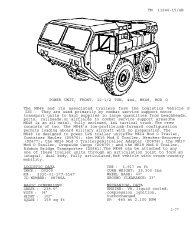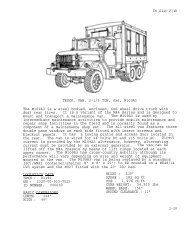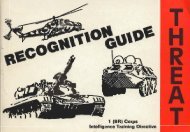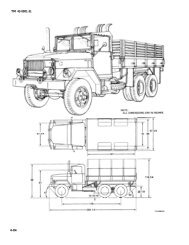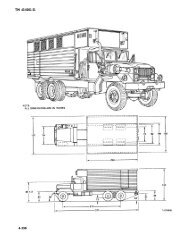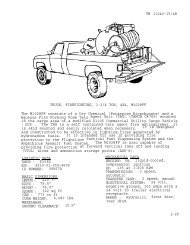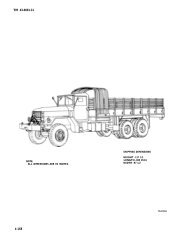- Page 1: Iraq Country Handbook 1. This handb
- Page 4 and 5: Contents (Continued) CULTURE . . .
- Page 6 and 7: Contents (Continued) Unconventional
- Page 8 and 9: Contents (Continued) Armor-Heavy Ba
- Page 11 and 12: KEY FACTS Official Name. Convention
- Page 13 and 14: Passport and Visa Requirements Pass
- Page 15 and 16: Sanctions regulations prohibit all
- Page 17 and 18: The southwest desert region is an e
- Page 19 and 20: BAGHDAD o F TEMPERATURE ELEVATION:
- Page 21 and 22: tember, the prevailing wind is call
- Page 23 and 24: that serve major industrial centers
- Page 25 and 26: and Printing, licenses newspapers a
- Page 27 and 28: Black Sea GEORGIA ARMENIA AZERBAIJA
- Page 29 and 30: important for the Western observer
- Page 31 and 32: Relationships Family and Social Int
- Page 33 and 34: facts or reinterpret them. Westerne
- Page 35 and 36: Disease Risks to Deployed Personnel
- Page 37 and 38: Saddam Husayn Cardiac Center Commen
- Page 39 and 40: The Ba’ath Party came to power in
- Page 41 and 42: Iraq-Syria-Lebanon Pipeline (Closed
- Page 43 and 44: to Amadiya. This area had been patr
- Page 45 and 46: Hussein’s power structure. Hussei
- Page 47: of sanctions. Russia’s diplomatic
- Page 51 and 52: In January 2002, President Bush sta
- Page 53 and 54: 27 Aug 92 “No-fly zone” imposed
- Page 55 and 56: 12 Nov 97 UNSC voted unanimously to
- Page 57 and 58: emains the RCC. A two-thirds majori
- Page 59 and 60: have specialized jurisdictions outs
- Page 61 and 62: TURKEY Dahuk SYRIA Euphrates Mosul
- Page 63 and 64: Ali Hasan al-Majid Mizban Khudr Had
- Page 65 and 66: Bordering Countries Jordan. Jordan
- Page 67 and 68: Turkey. Iraq and Turkey have had tr
- Page 69 and 70: the Saudis remain strongly allied w
- Page 71 and 72: TURKEY Mosul Arbil SYRIA Euphrates
- Page 73 and 74: Exports US$21,800,000,000 (2000 est
- Page 75 and 76: spare parts. Morale and discipline,
- Page 77 and 78: Strategy The RGFC heavy divisions,
- Page 79 and 80: 20,000 personnel make up the fronti
- Page 81 and 82: TURKEY Mosul Arbil SYRIA Euphrates
- Page 83 and 84: mon, even in Republican Guards unit
- Page 85 and 86: as to actual numbers of units and e
- Page 87 and 88: ■ Approximately 2,000-2,500 assor
- Page 89 and 90: econnaissance unit. Other assessed
- Page 91 and 92: operations, and has integrated them
- Page 93 and 94: ■ ■ area to establish blocking
- Page 95 and 96: Iraqi doctrine emphasizes that, reg
- Page 97 and 98: First Forward Combat Team Second Fo
- Page 99 and 100:
Recon Detachment Advance Force Dire
- Page 101 and 102:
Second Platoon First Platoon T-72 T
- Page 103 and 104:
Combat Team in Harbor, Box Formatio
- Page 105 and 106:
■ ■ ■ Meeting Engagement (Enc
- Page 107 and 108:
Infantry and Infantry Assault Point
- Page 109 and 110:
Recon Sections Recon Sections Forwa
- Page 111 and 112:
■ If a forward combat team is byp
- Page 113 and 114:
The missions of close range reconna
- Page 115 and 116:
■ ■ Blocking Units. Tank or mec
- Page 117 and 118:
■ ■ Reorganization Phase. Comba
- Page 119 and 120:
low the retreating enemy on the nor
- Page 121 and 122:
position to provide supporting fire
- Page 123 and 124:
During the final assault, tanks sho
- Page 125 and 126:
The type of defensive operation wil
- Page 127 and 128:
A unit in stationary defense attemp
- Page 129 and 130:
tle groups. To execute a deliberate
- Page 131 and 132:
could be deployed forward if the di
- Page 133 and 134:
Company in Defense Company in Lazy
- Page 135 and 136:
to one-third of the battle group’
- Page 137 and 138:
attle group may deploy in one echel
- Page 139 and 140:
50 m 50 m 125 m 200 m 800 m "Cattle
- Page 141 and 142:
meter-range) and the Iraqi-modified
- Page 143 and 144:
Special forces brigades subordinate
- Page 145 and 146:
VHF (Manuever Co.) Forward Observer
- Page 147 and 148:
emplacement method by either towed
- Page 149 and 150:
mately straight line on a specific
- Page 151 and 152:
2,500 meters from defensive positio
- Page 153 and 154:
GHQ to brigade level. GHQ controls
- Page 155 and 156:
■ ■ ■ ■ ■ ■ ■ Ensure
- Page 157 and 158:
The Iraqi inventory of countermine
- Page 159 and 160:
sacks or enhance the effectiveness
- Page 161 and 162:
Iraqi Landmine Holdings Conventiona
- Page 163 and 164:
cal measures of camouflage include
- Page 165 and 166:
point and refuel battalion armored
- Page 167 and 168:
Iraqi Special Forces are trained to
- Page 169 and 170:
near Abadan. The transfer and relea
- Page 171 and 172:
Offensive Chemical Warfare (CW) Cap
- Page 173 and 174:
Tanks Tanks can produce smokescreen
- Page 175 and 176:
Iraq still has a limited aerial rec
- Page 177 and 178:
employment of the early warning rad
- Page 179 and 180:
the U.S. to conduct strike operatio
- Page 181 and 182:
The primary means of air defense su
- Page 183 and 184:
ing down the most sophisticated hel
- Page 185 and 186:
ole. In a desert environment this t
- Page 187 and 188:
weather interceptors, excessive rel
- Page 189:
Although Iraq resumed operational a
- Page 192 and 193:
9-mm Makarov Maximum Effective Rang
- Page 194 and 195:
9-mm FN 35 (Browning Hi Power) Maxi
- Page 196 and 197:
Field Stripping the SKS/M59 A-6
- Page 198 and 199:
Field Stripping the AK-47/AKM/TABUK
- Page 200 and 201:
Rifle Grenade Firing Because of the
- Page 202 and 203:
7.62-mm RPK/Al-Quds Maximum Effecti
- Page 204 and 205:
7.62-mm PK Maximum Effective Range
- Page 206 and 207:
GRENADES, MORTARS, AND MINES RPG-7
- Page 208 and 209:
Iraqi Hand Grenades RG-42 Fragmenta
- Page 210 and 211:
Other Explosive Ordinance Hazards T
- Page 212 and 213:
T-62 Crew 4 Armament 1 x 115-mm 2A2
- Page 214 and 215:
Chieftain (Khalid) Crew 3 Armament
- Page 216 and 217:
Type 59 Crew 4 Armament 1 x 100-mm
- Page 218 and 219:
BMP-1 Crew/Passengers 3 + 8 Type tr
- Page 220 and 221:
BMD-1 Crew/Passengers 3 + 7 Type tr
- Page 222 and 223:
AML-60/7 Crew 3 Armament 60 mm mort
- Page 224 and 225:
BRDM-2 Crew/Passengers 4 Type 4 x 4
- Page 226 and 227:
M113A1 Crew/Passengers 2 + 11 Type
- Page 228 and 229:
Type 531/Type 63 Crew/Passengers 2
- Page 230 and 231:
MT-LB Crew/Passengers 2 + 11. Type
- Page 232 and 233:
BTR-50PU Command Vehicle Crew/Passe
- Page 234 and 235:
BTR-40 Crew/Passengers 2 + 8 Type 4
- Page 236 and 237:
BTR-152 Crew/Passengers 2 + 17 Type
- Page 238 and 239:
BTR-60 PU Command Vehicle Crew/Pass
- Page 240 and 241:
Panhard M3 Crew/Passengers 2 + 10 C
- Page 242 and 243:
M1977 100-mm Crew 8. Maximum Range
- Page 244 and 245:
AT-3 SAGGER Type Wire-guided MCLOS
- Page 246 and 247:
AT-5 SPANDREL Type Wire-guided SACL
- Page 248 and 249:
TOW Ground Tripod Launcher Max Rang
- Page 250 and 251:
VCR/TH (HOT) Crew 3 Configuration 4
- Page 252 and 253:
D-44 85-mm Divisional Gun Crew 8. M
- Page 254 and 255:
M-56 105-mm Mountain Gun Crew 7 Max
- Page 256 and 257:
D-30 122-mm Howitzer Crew 7 Maximum
- Page 258 and 259:
M46 130-mm Field Gun Crew 8 Maximum
- Page 260 and 261:
Type 66 152-mm Howitzer Crew 10 Max
- Page 262 and 263:
M114 155-mm Howitzer Crew 11 Maximu
- Page 264 and 265:
G5 155-mm Gun-Howitzer Crew 5. Cali
- Page 266 and 267:
2S3 152-mm SPH Crew 4 (+2 in ammuni
- Page 268 and 269:
M109/M109A1 155-mm SPH Crew 6 Armam
- Page 270 and 271:
M43 160-mm Mortar Crew 7 Maximum Ra
- Page 272 and 273:
Al-Jaleel 82-mm Mortar Maximum Rang
- Page 274 and 275:
Sajeel (Astros II) MRL SS-30 SS-40
- Page 276 and 277:
Ababeel 100-m MRL Armament 4 x 100-
- Page 278 and 279:
SCUD-B (Al-Hussein) ABOVE: An Al-Hu
- Page 280 and 281:
ZPU-4 (Quad) 14.5-mm Crew 5 Maximum
- Page 282 and 283:
GDF-001 35-mm Crew 5 Maximum Range
- Page 284 and 285:
S-60 57-mm Crew 7 Maximum Range 12,
- Page 286 and 287:
ZSU-23-4 23-mm SPAAG Crew 4 Armamen
- Page 288 and 289:
SA-7 GRAIL Crew 1 Maximum Range 3,2
- Page 290 and 291:
SA-2 GUIDELINE Maximum Range Combat
- Page 292 and 293:
SA-6 GAINFUL Type Guidance Maximum
- Page 294 and 295:
SA-9 GASKIN Type Guidance Maximum R
- Page 296 and 297:
DOG EAR Function EW/acquisition. Ra
- Page 298 and 299:
FLAT FACE Function Mobile EW radar.
- Page 300 and 301:
SPOON REST Function Mobile EW radar
- Page 302 and 303:
AIRCRAFT Mi-6HOOK Type Twin-turbine
- Page 304 and 305:
Mi-24D HIND Crew 4 Armament 1 x 4-b
- Page 306 and 307:
SA 330 Crew 2. Armament Assorted ro
- Page 308 and 309:
BK 117 Crew 2. Armament Assorted ro
- Page 310 and 311:
MiG-21/F-7 Crew 1 Armament 1 x twin
- Page 312 and 313:
MiG-25 Crew 1 Armament Air to Air m
- Page 314 and 315:
SU-24 Crew 2 Armament Assorted Air
- Page 316 and 317:
Pilatus PC-7 Crew 2. Armament Assor
- Page 318 and 319:
SURFACE SHIPS 1850-Ton FFT Characte
- Page 320 and 321:
PB 90 PB Characteristics Armament M
- Page 322 and 323:
SWARY 1 PB Characteristics Armament
- Page 324 and 325:
SWARY 6 PB Characteristics Newer, f
- Page 326 and 327:
NESTIN MSBI Characteristics Yugosla
- Page 329 and 330:
APPENDIX B: Organizational Charts S
- Page 331 and 332:
Division Headquarters Company Armor
- Page 333 and 334:
Infantry Brigade Infantry Battalion
- Page 335 and 336:
RGFC Division Headquarters Company
- Page 337:
Headquarters and Signal Company Spe
- Page 341 and 342:
APPENDIX D: Conversion Charts When
- Page 343 and 344:
➞ Temperature To convert Celsius
- Page 345:
Travel Distances A M M A N B A G H
- Page 349 and 350:
APPENDIX F Language Arabic Language
- Page 351 and 352:
Key Phrases (Capital letters indica
- Page 353 and 354:
F-5 English Arabic highway taRIQ ho
- Page 355 and 356:
English gun handgrenade headquarter
- Page 357:
APPENDIX G: International Road Sign
- Page 360 and 361:
First-aid post Petrol Garage One wa
- Page 362 and 363:
Hazardous snakes, plants, spiders,
- Page 364 and 365:
Uniforms correctly treated with per
- Page 366 and 367:
Cold Weather If cold weather injuri
- Page 368 and 369:
Abdominal Wound ■ Treatment: ❏
- Page 370 and 371:
■ Victims who must be moved shoul
- Page 372 and 373:
Thermal/Third Degree Symptoms: ■
- Page 375 and 376:
APPENDIX J: Individual Protective M
- Page 377 and 378:
■ ■ ■ ■ ■ ■ ■ Do not
- Page 379 and 380:
Foreign Terrorist Threat Terrorism
- Page 381 and 382:
■ ■ ■ conceal these and any o
- Page 383 and 384:
APPENDIX K: Dangerous Animals and P
- Page 385 and 386:
False-horned Viper Description: Adu
- Page 387 and 388:
Spiders Although there are several
- Page 389 and 390:
Comments: Originally called Jamesto
- Page 391 and 392:
Castor Oil Plant Other Name: Castor
- Page 393 and 394:
Strychnine Other names: Nuxvomica t
- Page 395:
APPENDIX L: International Telephone
- Page 398 and 399:
Fast, windblown sand can be extreme
- Page 400 and 401:
malfunction by one will rapidly pla
- Page 403 and 404:
Notes
- Page 405 and 406:
Notes
- Page 407 and 408:
Notes
- Page 409 and 410:
Notes



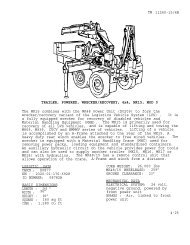
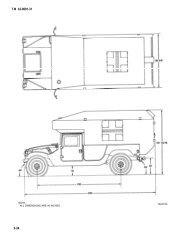
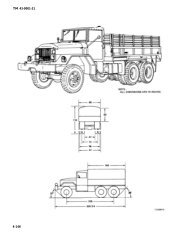
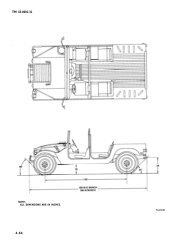
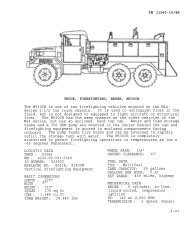
![Iguana Brochure [PDF] - JED](https://img.yumpu.com/49342897/1/184x260/iguana-brochure-pdf-jed.jpg?quality=85)
